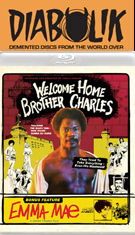
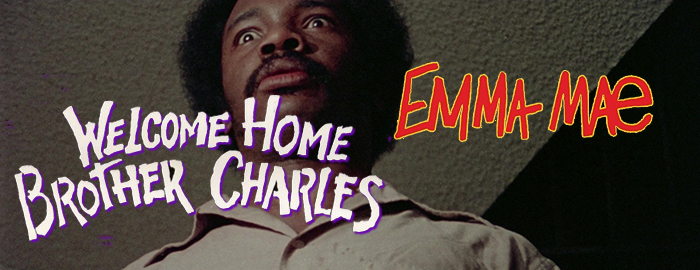
WELCOME HOME BROTHER CHARLES
Color, 1975, 103 mins. 19 secs.
Directed by Jamaa Fanaka
Starring Marlo Monte, Reatha Grey, Stan Kamber, Tiffany Peters, Ben Bigelow, Jake Carter
EMMA MAE
Color, 1976, 100 mins. 24 secs.
Directed by Jamaa Fanaka
Starring Jerri Hayes, Ernest Williams II, Charles D. Brooks III, Leopoldo Mandeville, Gammy Burdett, Eddy Dyer
Vinegar Syndrome (Blu-ray & DVD) (US R0 HD/NTSC) / WS (1.85:1) (16:9), Xenon (DVD) (US R1 NTSC)
In 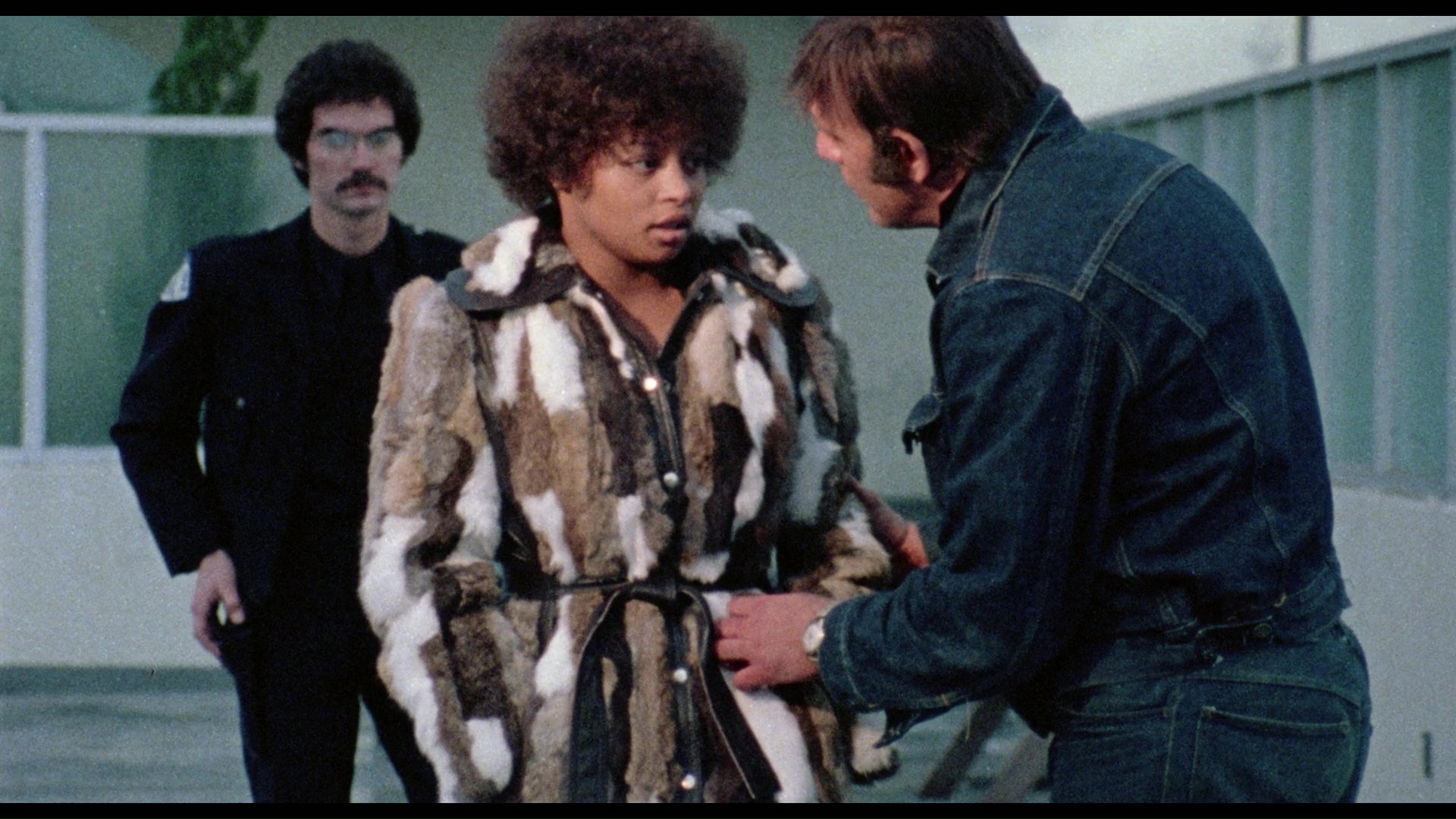 the history of America's
the history of America's 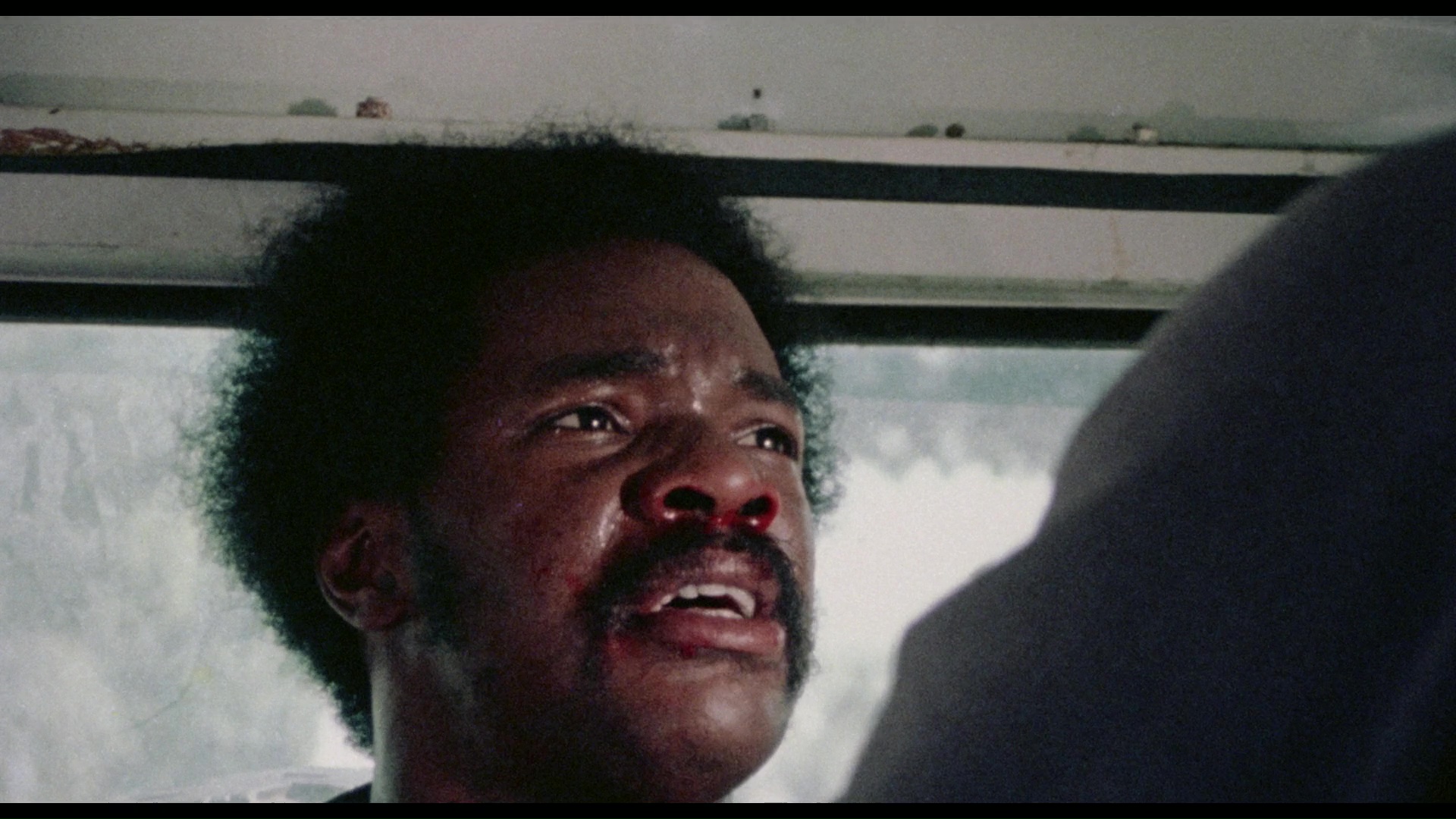 so-called blaxploitation revolution in the '70s, there's nothing else even remotely like Welcome Home Brother Charles. Promoted in theaters as a typical crime and revenge programmer, it later popped up on VHS as Soul Vengeance where its reputation skyrocketed in cult movie circles. The exact reason why has become the stuff of legend and really shouldn't be spoiled here since it comes near the end of the film, but let's just say it takes the film in a very supernatural, extreme direction that had viewers doubting their sanity and wondering whether they'd stumbled into a hentai title by mistake. It also sparked additional interest in director Jamaa Fanaka, most famous for the directing the Penitentiary trilogy and clearly a talent who enjoyed creating uneasy but fascinating, impassioned, and thoughtful mixtures of exploitation and social commentary.
so-called blaxploitation revolution in the '70s, there's nothing else even remotely like Welcome Home Brother Charles. Promoted in theaters as a typical crime and revenge programmer, it later popped up on VHS as Soul Vengeance where its reputation skyrocketed in cult movie circles. The exact reason why has become the stuff of legend and really shouldn't be spoiled here since it comes near the end of the film, but let's just say it takes the film in a very supernatural, extreme direction that had viewers doubting their sanity and wondering whether they'd stumbled into a hentai title by mistake. It also sparked additional interest in director Jamaa Fanaka, most famous for the directing the Penitentiary trilogy and clearly a talent who enjoyed creating uneasy but fascinating, impassioned, and thoughtful mixtures of exploitation and social commentary.
We first meet "brother" Charles Murray (Monte) as cops and the distraught Carmen (Grey) are trying to talk him down from jumping off of a roof. In flashback we see how he ran afoul of some sadistic, racist cops who beat him into a bloody  mess and, it appears, unsuccessfully tried to castrate him with a box cutter in the back of a police car. His fellow drug
mess and, it appears, unsuccessfully tried to castrate him with a box cutter in the back of a police car. His fellow drug 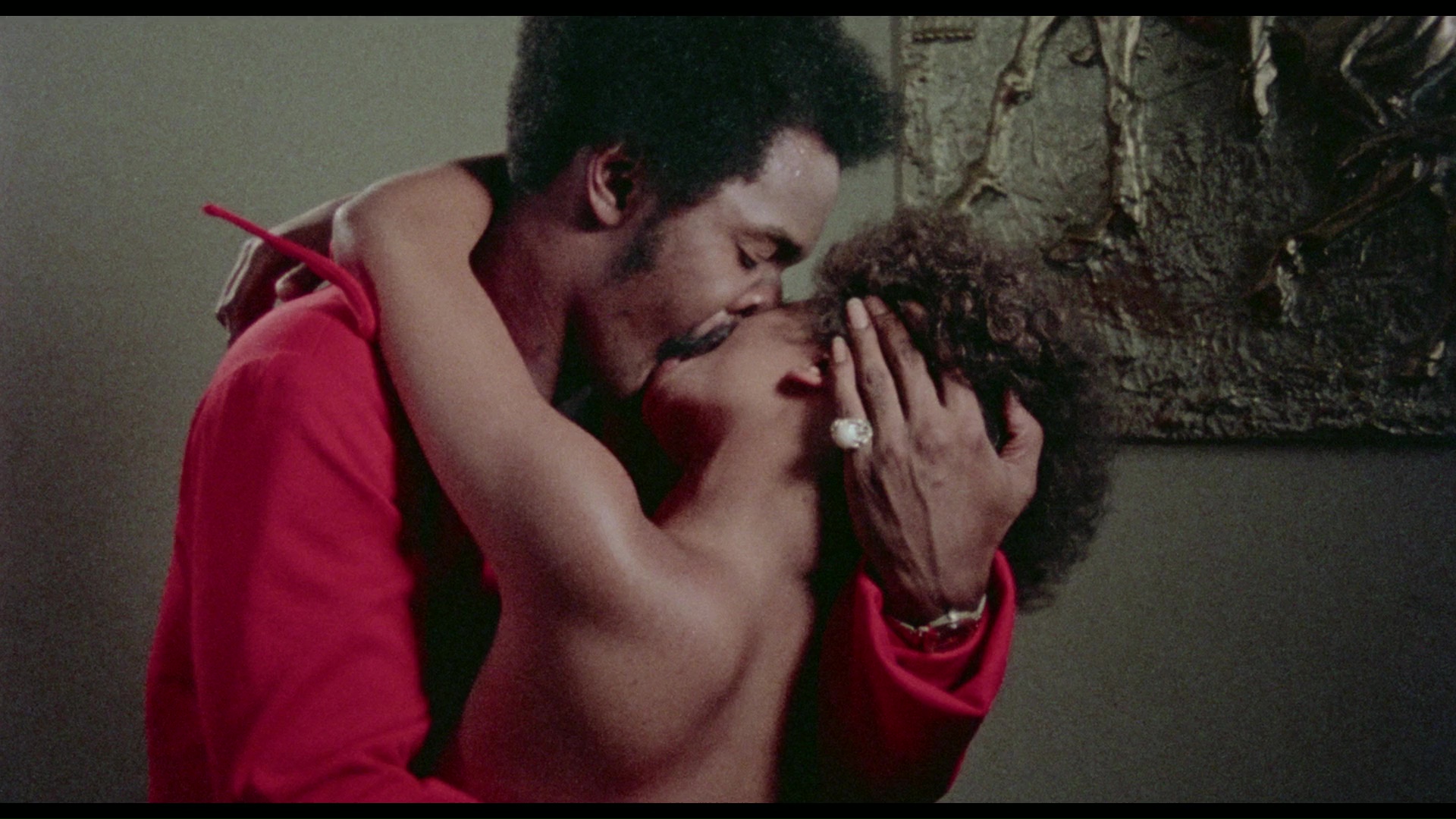 dealer partner N.D. (Carter) manages to slip away, but Charles ends up getting sent to prison for three years after a very volatile court appearance. Upon his release, Charles seems to be going straight and, with his ex-girlfriend now out of the picture and working for N.D., building a new life with former hooker Carmen. However, the men who ruined his life -- the judge, prosecutor, and especially the main arresting officer -- and their wives seem to be on an inexplicable hit list involving strangulation by someone or something unknown...
dealer partner N.D. (Carter) manages to slip away, but Charles ends up getting sent to prison for three years after a very volatile court appearance. Upon his release, Charles seems to be going straight and, with his ex-girlfriend now out of the picture and working for N.D., building a new life with former hooker Carmen. However, the men who ruined his life -- the judge, prosecutor, and especially the main arresting officer -- and their wives seem to be on an inexplicable hit list involving strangulation by someone or something unknown...
A gritty, grungy curio that really has to be seen to be believed, this film manages to veer all over the place to make statements about black persecution, rage against civilization, perceptions of race-based manhood, and the consequences of the abuse of power. If that sounds way too heady, well, don't worry; it's a drive-in movie to the core with nutty plot twists and overheated performances including lots and lots of yelling and iffy line deliveries.
Sharing space on the same disc is  another Fanaka feature made just before Penitentiary, the vibrant drama Emma Mae (retitled Black Sister's Revenge for video). Perhaps the most obscure of Fanaka's
another Fanaka feature made just before Penitentiary, the vibrant drama Emma Mae (retitled Black Sister's Revenge for video). Perhaps the most obscure of Fanaka's 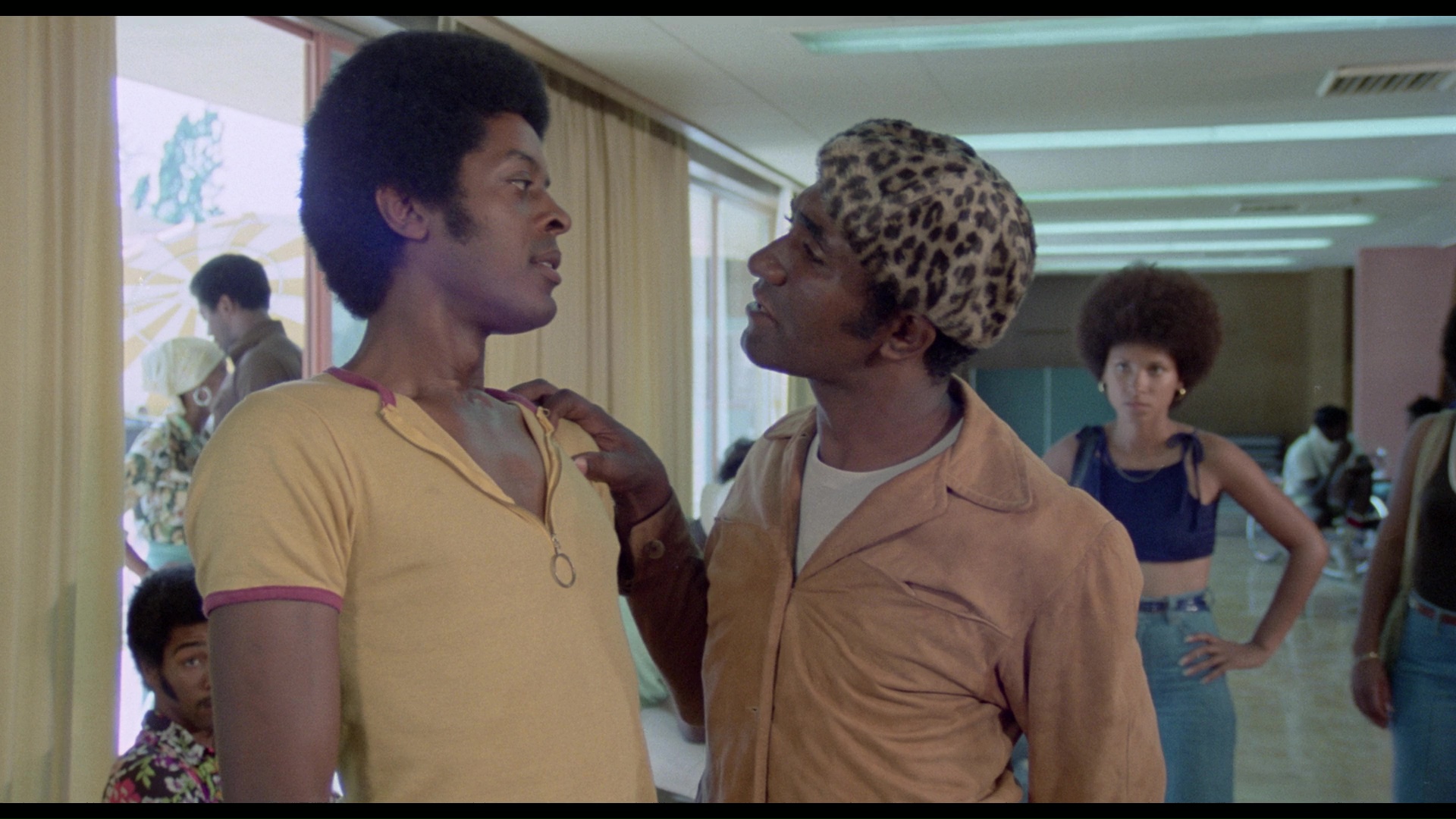 features, it's also ironically enough his most technically accomplished. A Greyhound bus arrives in suburban Compton with our title character (played by one-shot Jerri Hayes), a Southerner relocated to come live with her Aunt Daisy (Burdgett), Uncle Huari (Dyker), and her cousins after the death of her mother in Mississippi. Her cousins quickly tire of having to take her along for outings and dates, so they arrange to hook her up with drug addict Jesse (Williams II), who offers to take her to a local party that ends with someone's pants literally on fire. A run-in with the police puts Jesse in the slammer and Emma Mae on a crusade to get him released, first by rallying the community and then to taking more drastic illegal measures.
features, it's also ironically enough his most technically accomplished. A Greyhound bus arrives in suburban Compton with our title character (played by one-shot Jerri Hayes), a Southerner relocated to come live with her Aunt Daisy (Burdgett), Uncle Huari (Dyker), and her cousins after the death of her mother in Mississippi. Her cousins quickly tire of having to take her along for outings and dates, so they arrange to hook her up with drug addict Jesse (Williams II), who offers to take her to a local party that ends with someone's pants literally on fire. A run-in with the police puts Jesse in the slammer and Emma Mae on a crusade to get him released, first by rallying the community and then to taking more drastic illegal measures.
Funny, dramatic, and filled with '70s pop culture lingo ("Your mama's a boogie bear!"), this isn't really an exploitation film at all despite a few concessions like a 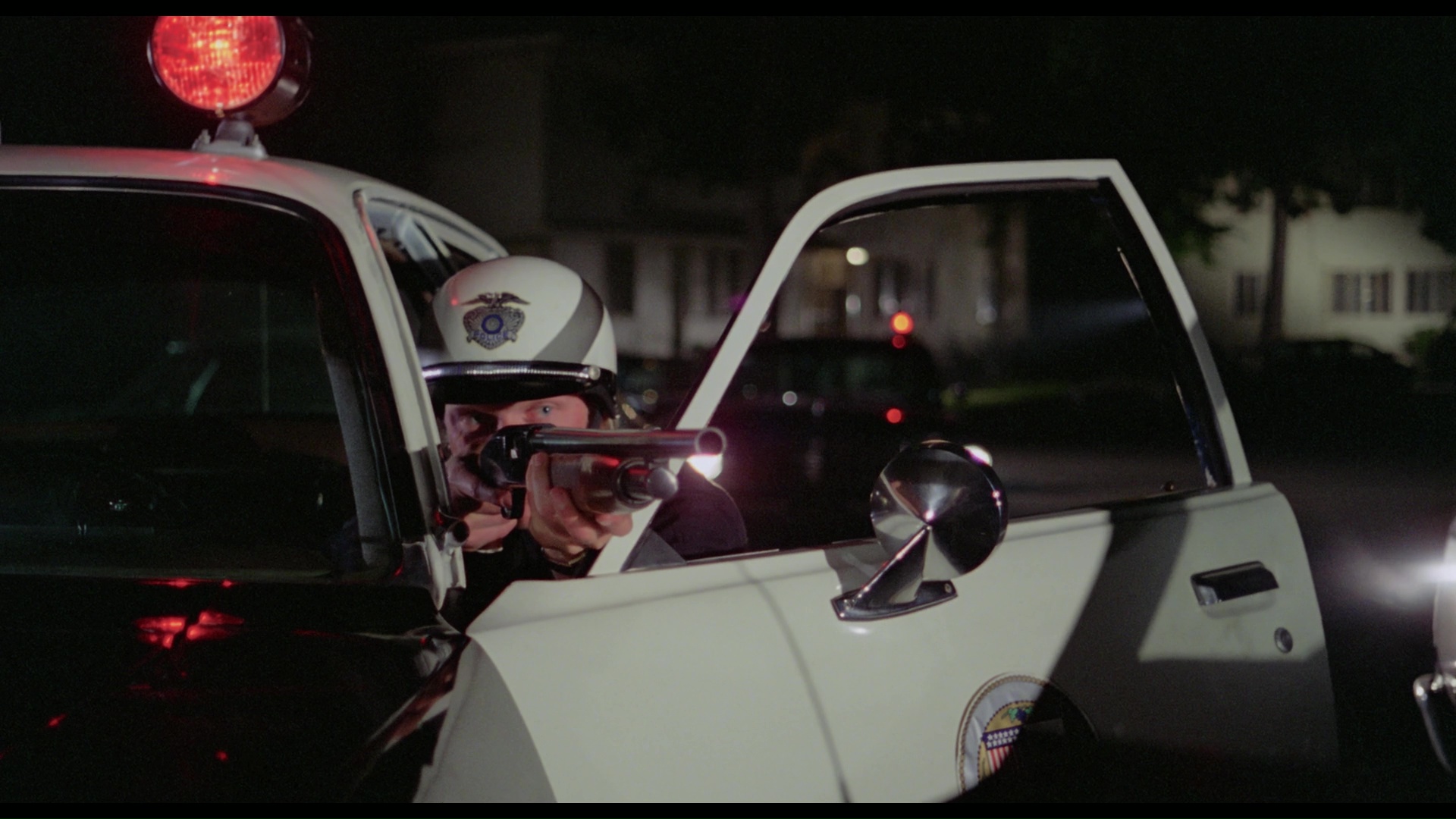 bank robbery and some really odd nudity ("Oooo, Emma, you got some big ones!"). The actors are sincere and effective here, and once again we're given a story centering about the treatment of a drug dealer who may or may not be a victim of society. The perspective in this case is interesting since it
bank robbery and some really odd nudity ("Oooo, Emma, you got some big ones!"). The actors are sincere and effective here, and once again we're given a story centering about the treatment of a drug dealer who may or may not be a victim of society. The perspective in this case is interesting since it 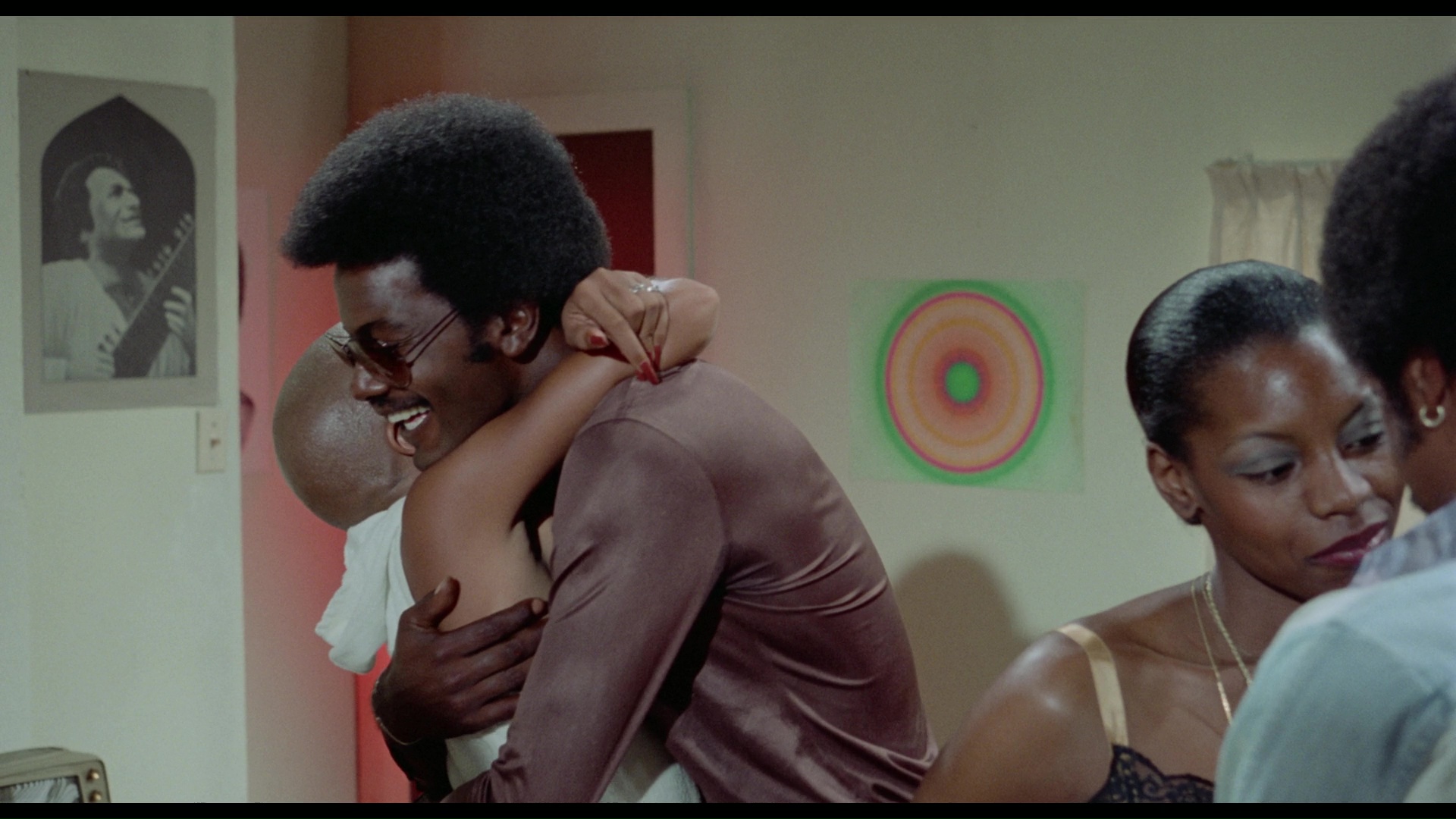 occur over a very compressed time period (essentially a couple of days) and through the eyes of a black female outsider, with Hayes giving an unusual performance that makes you wish she'd stuck around for a few more films.
occur over a very compressed time period (essentially a couple of days) and through the eyes of a black female outsider, with Hayes giving an unusual performance that makes you wish she'd stuck around for a few more films.
Both features were given VHS releases from Xenon back in the '80s under their more exploitable new titles, which is also how they appeared on DVD as a triple feature along with The Black Godfather (still using murky old masters). The new transfers on Vinegar Syndrome's release are both light years beyond what we've seen before; Brother Charles, sporting a Crown International logo, has been a notorious one when it comes to finding good elements, so it's safe to assume that what's here is as good as it's going to get. It's obvious much, much better than the often impenetrably dim Xenon version, but it's also very grainy and rough-looking, presumably on purpose. Emma Mae on the other hand looks gorgeous with vibrant colors and terrific detail; it's the most attractive release of a 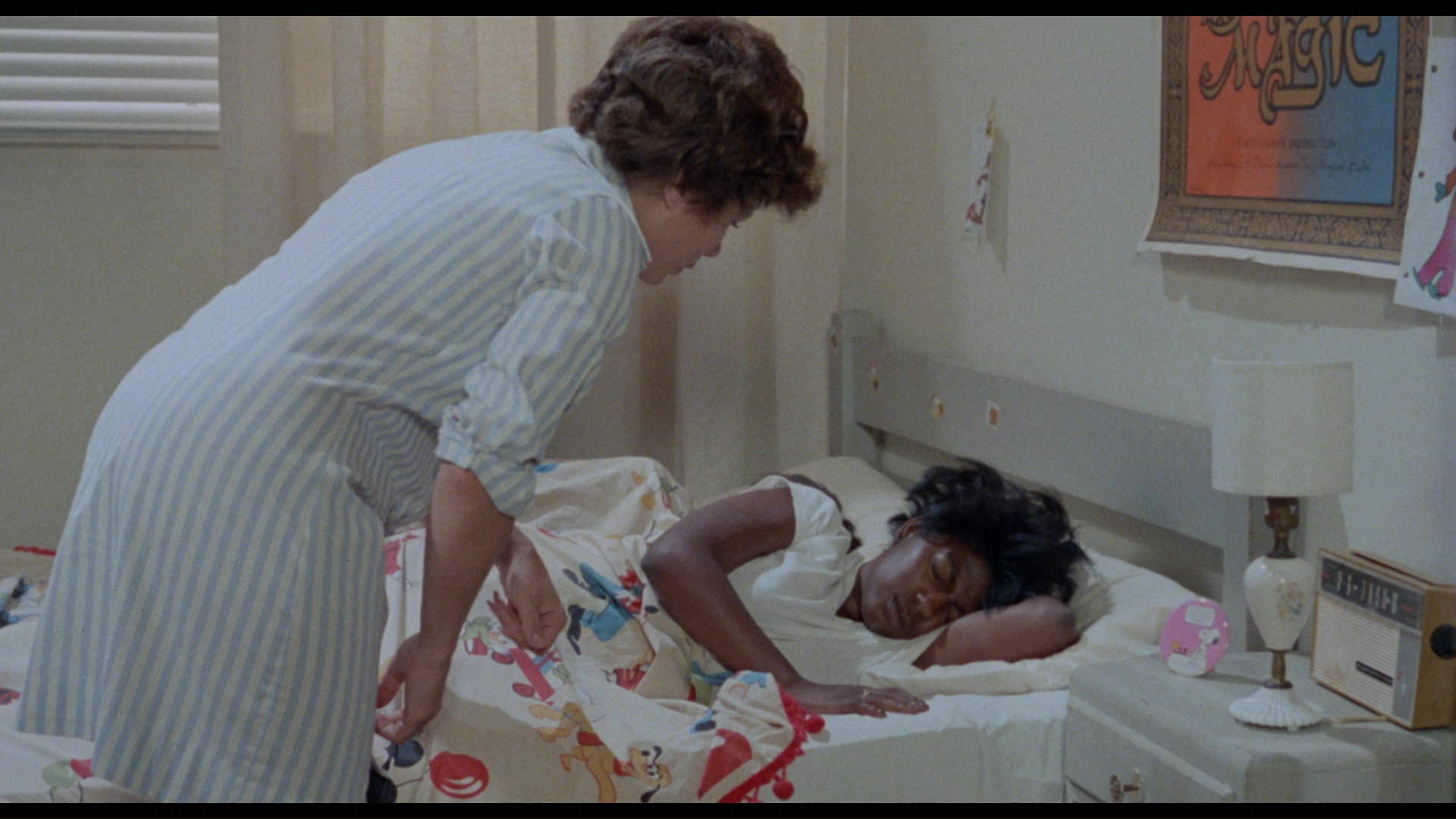 Fanaka title to date and should win over anyone who wasn't too big on this film before. Both films have solid LPCM English mono tracks on the
Fanaka title to date and should win over anyone who wasn't too big on this film before. Both films have solid LPCM English mono tracks on the 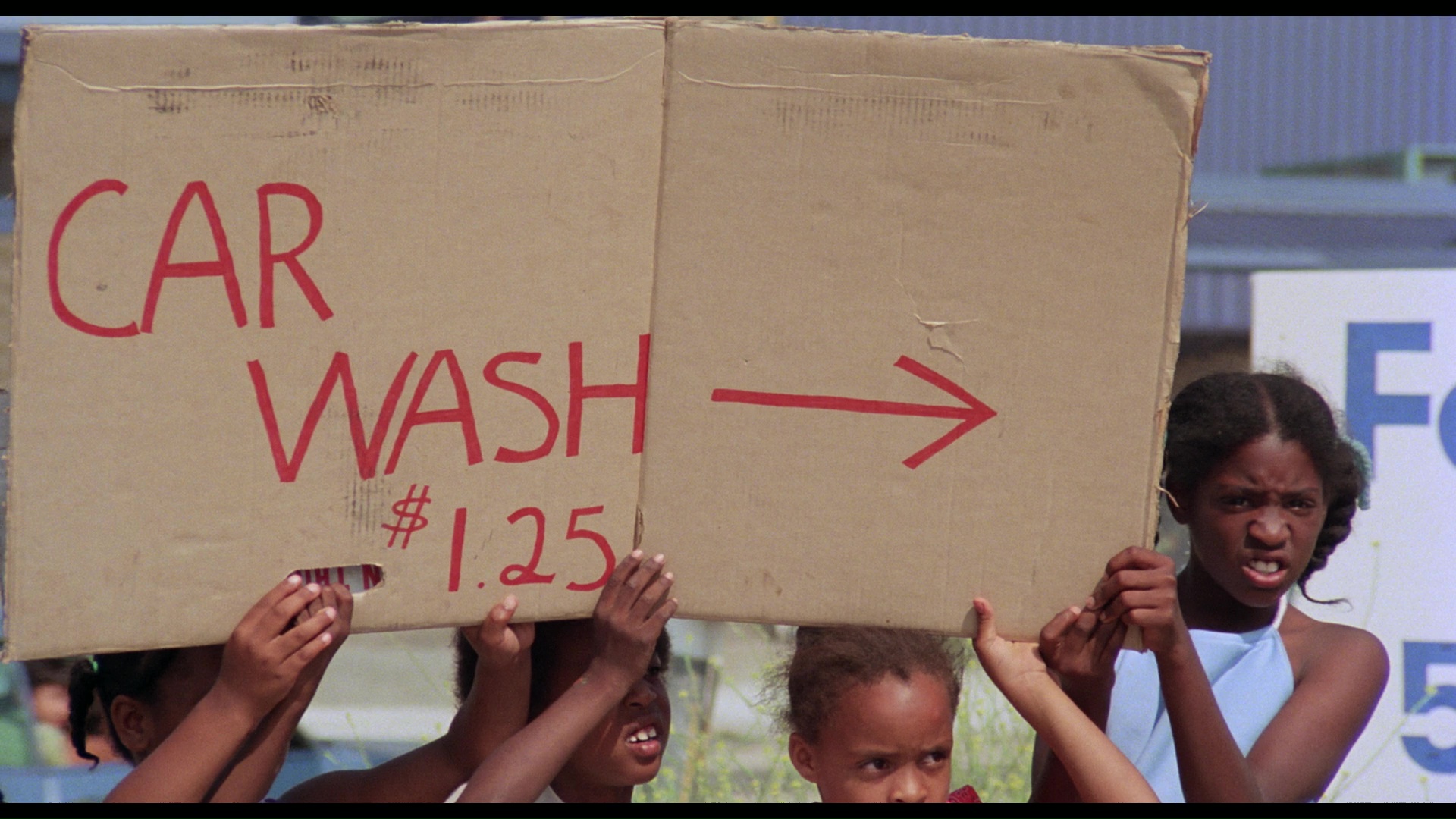 Blu-ray with optional English SDH subtitles. In “The History of the L.A. Rebellion & Jamaa Fanaka” (31m8s), the UCLA Film & Television Archive's Jan-Christopher Horak talks about the evolution of black independent filmmaking from the silent era to Fanaka and explains how films like these played a major part in the depiction of black culture on film in Los Angeles after the turbulent '60s. Anyone wondering what happened to Hayes will find out in a Q&A (20m16s) from a 2017 screening at Brooklyn's BAMcinématek, with moderator Jesse Trussell guiding her through an account of how she became involved as a theater student and embarked on an acting adventure that still makes her emotional. Like the first Penitentiary, these films were essentially started as student films and retain that vibe, which is actually an asset in this case. She also offers a moving account of her friendship with Fanaka including their last conversation before his death. A partially bleeped but still very profane trailer for Welcome Home Brother Charles is included along with two cleaner teasers.
Blu-ray with optional English SDH subtitles. In “The History of the L.A. Rebellion & Jamaa Fanaka” (31m8s), the UCLA Film & Television Archive's Jan-Christopher Horak talks about the evolution of black independent filmmaking from the silent era to Fanaka and explains how films like these played a major part in the depiction of black culture on film in Los Angeles after the turbulent '60s. Anyone wondering what happened to Hayes will find out in a Q&A (20m16s) from a 2017 screening at Brooklyn's BAMcinématek, with moderator Jesse Trussell guiding her through an account of how she became involved as a theater student and embarked on an acting adventure that still makes her emotional. Like the first Penitentiary, these films were essentially started as student films and retain that vibe, which is actually an asset in this case. She also offers a moving account of her friendship with Fanaka including their last conversation before his death. A partially bleeped but still very profane trailer for Welcome Home Brother Charles is included along with two cleaner teasers.
Reviewed on April 2, 2018.



 the history of America's
the history of America's  so-called blaxploitation revolution in the '70s, there's nothing else even remotely like Welcome Home Brother Charles. Promoted in theaters as a typical crime and revenge programmer, it later popped up on VHS as Soul Vengeance where its reputation skyrocketed in cult movie circles. The exact reason why has become the stuff of legend and really shouldn't be spoiled here since it comes near the end of the film, but let's just say it takes the film in a very supernatural, extreme direction that had viewers doubting their sanity and wondering whether they'd stumbled into a hentai title by mistake. It also sparked additional interest in director Jamaa Fanaka, most famous for the directing the Penitentiary trilogy and clearly a talent who enjoyed creating uneasy but fascinating, impassioned, and thoughtful mixtures of exploitation and social commentary.
so-called blaxploitation revolution in the '70s, there's nothing else even remotely like Welcome Home Brother Charles. Promoted in theaters as a typical crime and revenge programmer, it later popped up on VHS as Soul Vengeance where its reputation skyrocketed in cult movie circles. The exact reason why has become the stuff of legend and really shouldn't be spoiled here since it comes near the end of the film, but let's just say it takes the film in a very supernatural, extreme direction that had viewers doubting their sanity and wondering whether they'd stumbled into a hentai title by mistake. It also sparked additional interest in director Jamaa Fanaka, most famous for the directing the Penitentiary trilogy and clearly a talent who enjoyed creating uneasy but fascinating, impassioned, and thoughtful mixtures of exploitation and social commentary.  mess and, it appears, unsuccessfully tried to castrate him with a box cutter in the back of a police car. His fellow drug
mess and, it appears, unsuccessfully tried to castrate him with a box cutter in the back of a police car. His fellow drug  dealer partner N.D. (Carter) manages to slip away, but Charles ends up getting sent to prison for three years after a very volatile court appearance. Upon his release, Charles seems to be going straight and, with his ex-girlfriend now out of the picture and working for N.D., building a new life with former hooker Carmen. However, the men who ruined his life -- the judge, prosecutor, and especially the main arresting officer -- and their wives seem to be on an inexplicable hit list involving strangulation by someone or something unknown...
dealer partner N.D. (Carter) manages to slip away, but Charles ends up getting sent to prison for three years after a very volatile court appearance. Upon his release, Charles seems to be going straight and, with his ex-girlfriend now out of the picture and working for N.D., building a new life with former hooker Carmen. However, the men who ruined his life -- the judge, prosecutor, and especially the main arresting officer -- and their wives seem to be on an inexplicable hit list involving strangulation by someone or something unknown... another Fanaka feature made just before Penitentiary, the vibrant drama Emma Mae (retitled Black Sister's Revenge for video). Perhaps the most obscure of Fanaka's
another Fanaka feature made just before Penitentiary, the vibrant drama Emma Mae (retitled Black Sister's Revenge for video). Perhaps the most obscure of Fanaka's  features, it's also ironically enough his most technically accomplished. A Greyhound bus arrives in suburban Compton with our title character (played by one-shot Jerri Hayes), a Southerner relocated to come live with her Aunt Daisy (Burdgett), Uncle Huari (Dyker), and her cousins after the death of her mother in Mississippi. Her cousins quickly tire of having to take her along for outings and dates, so they arrange to hook her up with drug addict Jesse (Williams II), who offers to take her to a local party that ends with someone's pants literally on fire. A run-in with the police puts Jesse in the slammer and Emma Mae on a crusade to get him released, first by rallying the community and then to taking more drastic illegal measures.
features, it's also ironically enough his most technically accomplished. A Greyhound bus arrives in suburban Compton with our title character (played by one-shot Jerri Hayes), a Southerner relocated to come live with her Aunt Daisy (Burdgett), Uncle Huari (Dyker), and her cousins after the death of her mother in Mississippi. Her cousins quickly tire of having to take her along for outings and dates, so they arrange to hook her up with drug addict Jesse (Williams II), who offers to take her to a local party that ends with someone's pants literally on fire. A run-in with the police puts Jesse in the slammer and Emma Mae on a crusade to get him released, first by rallying the community and then to taking more drastic illegal measures.  bank robbery and some really odd nudity ("Oooo, Emma, you got some big ones!"). The actors are sincere and effective here, and once again we're given a story centering about the treatment of a drug dealer who may or may not be a victim of society. The perspective in this case is interesting since it
bank robbery and some really odd nudity ("Oooo, Emma, you got some big ones!"). The actors are sincere and effective here, and once again we're given a story centering about the treatment of a drug dealer who may or may not be a victim of society. The perspective in this case is interesting since it  occur over a very compressed time period (essentially a couple of days) and through the eyes of a black female outsider, with Hayes giving an unusual performance that makes you wish she'd stuck around for a few more films.
occur over a very compressed time period (essentially a couple of days) and through the eyes of a black female outsider, with Hayes giving an unusual performance that makes you wish she'd stuck around for a few more films.  Fanaka title to date and should win over anyone who wasn't too big on this film before. Both films have solid LPCM English mono tracks on the
Fanaka title to date and should win over anyone who wasn't too big on this film before. Both films have solid LPCM English mono tracks on the  Blu-ray with optional English SDH subtitles. In “The History of the L.A. Rebellion & Jamaa Fanaka” (31m8s), the UCLA Film & Television Archive's Jan-Christopher Horak talks about the evolution of black independent filmmaking from the silent era to Fanaka and explains how films like these played a major part in the depiction of black culture on film in Los Angeles after the turbulent '60s. Anyone wondering what happened to Hayes will find out in a Q&A (20m16s) from a 2017 screening at Brooklyn's BAMcinématek, with moderator Jesse Trussell guiding her through an account of how she became involved as a theater student and embarked on an acting adventure that still makes her emotional. Like the first Penitentiary, these films were essentially started as student films and retain that vibe, which is actually an asset in this case. She also offers a moving account of her friendship with Fanaka including their last conversation before his death. A partially bleeped but still very profane trailer for Welcome Home Brother Charles is included along with two cleaner teasers.
Blu-ray with optional English SDH subtitles. In “The History of the L.A. Rebellion & Jamaa Fanaka” (31m8s), the UCLA Film & Television Archive's Jan-Christopher Horak talks about the evolution of black independent filmmaking from the silent era to Fanaka and explains how films like these played a major part in the depiction of black culture on film in Los Angeles after the turbulent '60s. Anyone wondering what happened to Hayes will find out in a Q&A (20m16s) from a 2017 screening at Brooklyn's BAMcinématek, with moderator Jesse Trussell guiding her through an account of how she became involved as a theater student and embarked on an acting adventure that still makes her emotional. Like the first Penitentiary, these films were essentially started as student films and retain that vibe, which is actually an asset in this case. She also offers a moving account of her friendship with Fanaka including their last conversation before his death. A partially bleeped but still very profane trailer for Welcome Home Brother Charles is included along with two cleaner teasers.